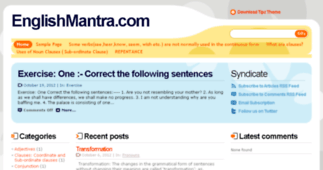EnglishMantra.com
Enter a key term, phrase, name or location to get a selection of only relevant news from all RSS channels.
Enter a domain's or RSS channel's URL to read their news in a convenient way and get a complete analytics on this RSS feed.
Unfortunately EnglishMantra.com has no news yet.
But you may check out related channels listed below.
[...] must have success. 4. The book (not, it) that is lying on the table is not mine. 7. A relative pronoun ( who, whom, whose, which, that, as, etc.) agrees with its antecedent in number, gender and [...]
[...] me. 5. Do you know why your brothers have gone against you? 4. In sentences where the subordinate clause denotes ‘ purpose or result or effect’ if the verb in the principal clause is [...]
[...] ; is used with a ‘that–clause’ it takes an indirect object while the verb ‘say’ does not ;as, 1. The man told me what had happened with him. [...]
[...] (indirect obj) a book.(direct obj) N.B. Prepositions (to, for, etc.) must be placed if the indirect object comes after the direct object. (B) ‘Intransitive Verb’ is verb that indicates a [...]
[...] . 5. The young man wanted me to advise him whether he should abandon his village. 6. The transitive verbs ‘ order, discuss, describe, and request’ are not followed by preposition; as, 1. [...]
[...] hand over), apply, exert, revenge, hurt, injure, hide,’ are some of the transitive verbs that are followed by reflexive pronouns;as, 1. We must avail ourselves of the [...]
[...] class) passed the examination. 2. Each boy may take three tries.(not replaced by all and the plural noun) 3. All the boys were given a book each. 4. The wheels each have twelve spokes. 5. We each wish [...]
[...] anyone else’ knowing. 9. The apostrophe (‘s, s’) is not used when the plural noun is suffixed with ‘s or es’ and when the nouns are in the neuter gender;as, 1. [...]
[...] present-day English, the pronouns mentioned under ’14′, are often followed by a plural pronoun( they,them,their);as, 1. Everyone is willing to have his(their) share. 2. Everyone is [...]
[...] who obey her. 2. Two or more singular nouns/pronouns joined by ‘and’ take a plural verb;as, 1. Gold and silver are precious metal. 2. You and your friend were not present in the [...]
[...] ;its/its N.B. The pronouns in the possessive case followed by nouns/noun-equivalent are possessive adjectives. 1. These books are mine and the books lying on the table are yours. 2. We all make our [...]
[...] must have success. 4. The book (not, it) that is lying on the table is not mine. 7. A relative pronoun ( who, whom, whose, which, that, as, etc.) agrees with its antecedent in number, gender and [...]
Related channels
-
Gmail.com Login Sign in - Create www.gmail.com Account
www.Gmail.com SignIn | www.Gmail.com Login Inbox | www.Gmail.com Signup | Gmail.com Account Login | Gmail Account Passwo...
- Mohammed Amine BENABDALLAH
-
123telugu.com
Latest Telugu Cinema News
-
Www.Gmail.com
www.Gmail.com Sign Up | www.Gmail.com Inbox | www.Gmail.com Sign In | www.Gmail.com Login
-
Askwiki
Did you Askwiki Today ?

